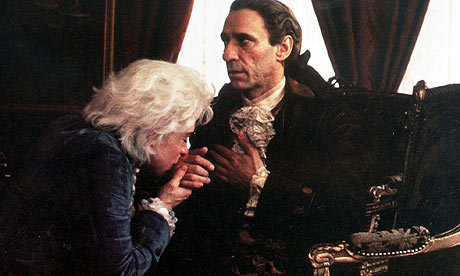Opening-night review of *Sylvia*
 At the Civic’s Studio Theater through Feb. 21
At the Civic’s Studio Theater through Feb. 21You’ll be reminded of some simple truths and learn a few lessons during director Brooke Kiener’s production of A.R. Gurney’s romantic-doggy-triangle of a love-comedy, Sylvia. Sharing and self-sacrifice are important, for instance. Naysayers are no fun, but fun-lovers are lots of … fun, for a couple of others.
In a good but not-as-good-as-it-could-be production, pacing and tonal shifts are a problem. But the dog lovers’ fantasy -- a show with an actress playing a talking dog -- creates a lot of infectious energy, love and fun. There’s even some marital counseling and lessons in self-determination along the way.
Sylvia is a lovable mutt of a play, a mix of comedy and seriousness -- something to return to for reassurance and reminders.
And it’s a script that’s being served here by two exceptionally good performances — by Beth Carey as the dog and by Bill Forant as Greg, the man who finds Sylvia wandering one day in Central Park.
When called upon, Carey scurries and scampers and sniffs as Sylvia -- leaping into arms, hopping up and down, hugging Greg’s knees, nearly dry-humping a house guest. (She feels bad about that. She went overboard. Her features darken, she bows her head.)
Carey’s adoring eyes laser in on the man who saved her life; she kneels on command, but only resentfully. Her performance ranges from insecurity to mysteriousness, from sexy to resentful, from horny to child-like. Carey has a tomboy vocal quality, full of angry rumbles, that makes the show’s funniest sequence — Sylvia’s getting livid at the sight of a filthy stinkin’ cat — even funnier. For the comedy, Carey has clearly done her doggy homework; for the serious advice scenes, she relies on her own personal assertiveness. It‘s a performance with many facets, and it’s fun to watch. (Full disclosure: Carey formerly worked at The Inlander as a sales rep.)
Forant allowed the sentiment of the final scene to overwhelm him for a moment -- but he also carefully calibrated how to build up the sadness in the scene when Greg is forced to decide between his dog and his wife: with hunched back, eyes glistening, voice breaking, he presented a strong contrast to his earlier, puppyish, new-dog-owner self.
Jerry Sciarrio contributes three small roles, and while his macho New Yorker and sexually ambiguous marriage counselor were well observed, he didn’t create much vocal differentiation at all for his Freudian-slipping socialite. Particularly on entrances and exits, however, Sciarrio shares a lot of well-observed characterizing details about the three figures he portrays. And watch for how much comedy Sciarrio extracts from such little things as a well-timed purse snap and a grimacing refusal to drink a glass of water.
In at least one thrust-stage scene, director Kiener kept husband and wife rooted to the couch long enough for some playgoers to become over-familiar with the backs of heads. But she also directs Sylvia’s rambunctious scenes with verve, and she gets mileage out of a bit when Greg expresses his preference for manufacturing over trading currencies, for things over abstractions, and reaches out to touch someone who, for him, is as real as it gets: Sylvia.
I don’t want to say goodbye to my memories of Gurney’s script any more than I ever want to say goodbye to my own dogs.
Labels: A.R. Gurney Jr., Brooke Kiener, Spokane Civic Theater, Sylvia

















.jpg)









